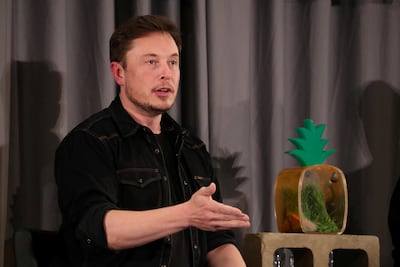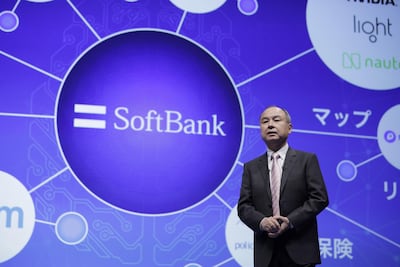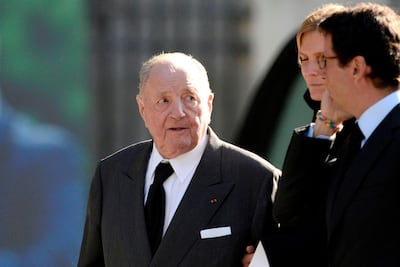Xavier Niel
Once a prolific car thief who did time in prison, Tally Fofana now has a billionaire's backing as he seeks to turn knowledge gained from his criminal past into a vehicle anti-theft device.
Mr Fofana, 39, is just one of the unconventional rookie entrepreneurs Xavier Niel, the founder of phone company Iliad, has made a habit of supporting. People who, in fact, are a lot like Niel himself when he first started out.
“We believe in people who haven’t been formatted,” Mr Niel says. “People who haven’t been in the same business for ever are able to have a fresh take on an industry that can then be disrupted.”
It’s these kinds of people who need to succeed for President Emmanuel Macron to convince voters that his plan for a more dynamic “start-up nation” is working and reverse tumbling popularity ratings. French politics and business are still dominated by a narrow elite that graduated from a handful of prestigious universities.
Mr Niel, 51, is the partner to luxury goods executive Delphine Arnault (daughter of France’s richest man, Bernard Arnault), co-owns newspaper Le Monde and backed Macron’s presidential bid. he has a net worth of $5.2 billion according to the Bloomberg Billionaires Index.
Though he cuts his hair a little shorter now and has started wearing suits to investor roadshows, he still sees himself as the nonconformist’s champion.
Mr Niel set up tuition-free coding schools in Paris and Silicon Valley and has poured 250 million euros (Dh1.04bn) into a start-up campus - Station F - which opened last year in a cavernous former rail depot in the French capital. Mr Fofana’s car security expertise won him a place on Station F's Founders programme for budding entrepreneurs and he’s now in fundraising talks with potential investors.
Mr Niel says France will generate 10 companies with valuations above $1bn in the next three years or so.
Elon Musk
It’s been almost 30 years since Elon Musk left South Africa to start a new life in North America. Now, the billionaire may be about to bring his Tesla electric cars back home.
“Probably end of next year,” the chief executive officer of Tesla replied to a South African fan on Twitter, who asked him when a store would open in the country of the businessman’s birth. “Amazing - I’m first in line when it happens!” replied the individual.
Tesla has stores across the globe, including the US, Germany, the UAE, China and Australia. But it has none in Africa, which has been broadly left out of the electric-car revolution Tesla pioneered. Lower average incomes and poor power infrastructure mean petrol-powered cars - often bought second hand - dominate most markets on the continent.
South Africa is Africa’s most industrialised economy, but it’s not immune to those challenges. Cash constraints and delayed power plants at state utility Eskom Holdings SOC have led to rolling blackouts. While it’s not unheard of to see an electric car on the road, they remain the preserve of the super-rich, and charging stations would be hard to come by.
Mr Musk, 47, left South Africa for Canada after graduating from high school in Pretoria in 1989, still five years before the end of apartheid. But the self-made billionaire and founder of Space Exploration Technologies is still well known there.
Opening a Tesla store there could be a popular move.
Masayoshi Son
Shoppers in Japan are racing to see who can spend Masayoshi Son’s money the fastest.
The tech billionaire and SoftBank Group founder has triggered a shopping frenzy by promising to give away 10 billion yen (Dh324m) in rebates to users of PayPay, a new digital payment app released by a subsidiary of the mobile carrier. The campaign offers 20 per cent off purchases at select retailers, while SoftBank subscribers get another 1-in-10 chance to receive the whole amount back. Discounts are capped at 100,000 yen per transaction.
The marketing campaign, offering bargains at the height of the Christmas shopping season, has ignited a rush to electronic retailers such as Bic Camera, with long lines reported across the country according to social media accounts. Gleeful users have been showing off everything from Mac laptops to Sony TVs and Nintendo Switch consoles bought at deep discounts through the app since the campaign began earlier this month.
“Bought an iPad Pro with PayPay and my parents bought a (Microsoft) Surface, and we both got all our money back. Our luck is too good!" wrote one Twitter user. “I finally figured out why Bic Camera has been so packed,” wrote another, attaching a screenshot of 100,000 yen rebate after spending 104,544 yen.
Shares of Bic Camera have outperformed the broader Topix index by 15 per cent since the campaign was announced last month. Others supporting PayPay include convenience store operator FamilyMart UNY Holdings, electronics retailers Yamada Denki and Joshin Denki, and travel agent operator HIS.
PayPay has been the No.1 most-downloaded app on Apple devices throughout the country every day since the campaign began, according to data researcher Sensor Tower. It was launched in partnership with Yahoo Japan and India’s largest digital-payments company Paytm, which supplied the Quick Response payment technology.
PayPay’s campaign runs until March 31, although users on Japanese social media sites have already begun guessing when the 10 billion yen could run out. Others have speculated about the profitability of buying items through the discounts and re-selling them online for higher prices.
SoftBank declined to comment on how much has been spent on the marketing blitz so far or how long the campaign will run for.
Albert Frere
Albert Frere spent more than half a century crossing the globe to strike deals before he died this week, leaving a legacy that knitted together dynastic fortunes and transformed Europe’s corporate landscape.
It took just days for his $5.7bn estate to be transferred to his children.
Mr Frere’s 41 year-old daughter Segolene Gallienne and her older brother, Gerald Frere, 67, now control the family’s Groupe Frere-Bourgeois, which has net assets of 5.5 billion euros. The ownership change was reported in a statement by Groupe Bruxelles Lambert, whose assets include stakes in Adidas and Pernod Ricard. The Frere family hold an indirect stake in GBL.
If the Frere empire is split equally, the duo would each inherit almost $3bn, according to the Bloomberg Billionaires Index.
The pair are already part of the family business. Ms Gallienne sits on the board of both companies, and her husband, Ian, is co-chief executive of Groupe Bruxelles Lambert. Mr Frere is chairman of Groupe Bruxelles Lambert and vice chairman of Pargesa.
Ms Gallienne joins the burgeoning ranks of female billionaires, although they remain significantly under-represented among the world’s wealthiest and comprise about 10 per cent of Bloomberg’s ranking of the top 500 fortunes. Francoise Bettencourt Meyers, the largest shareholder of cosmetics company L’Oreal, is the world’s richest woman with a net worth of $46.3bn.




